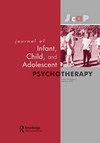情感的发展路线:情感情境化与早期发展性精神病理学心理动力学治疗的相关性
Q3 Psychology
Journal of Infant, Child, and Adolescent Psychotherapy
Pub Date : 2023-04-03
DOI:10.1080/15289168.2023.2205755
引用次数: 1
摘要
在本文中,我们介绍了临床工作、神经科学和进化人类学的观点,这些观点共同提供了一个有用的框架来思考和临床治疗早期发展性精神病理学患者,特别是边缘型人格结构的某些方面。我们的观点是,将情感发展的一系列概念化,从基本的、主要的情感开始,到细微的、情境化的、第三的情感,有助于定位一些患者情感不稳定和失调的起源。当这条情感发展路线被打断时,一个有限的、僵化的自我就会发展起来。当第三情感的发展得到促进时,它允许一个更丰富、更灵活的自我。我们还认为,与作为防御的分裂不同,一种非黑即白的认知形式经常伴随着初级和次级情感的早期体验。当更复杂的、情境化的情感发展中断时,这种二元形式的认知倾向于持续存在,但当这种发展得到促进时,更丰富、更细致的认知形式也有助于形成更强大的自我。本文章由计算机程序翻译,如有差异,请以英文原文为准。
A Developmental Line for Affects: The Relevance of Contextualization of Affects for the Psychodynamic Treatment of Early Developmental Psychopathology
ABSTRACT In this paper we present perspectives from clinical work, neuroscience, and evolutionary anthropology that together provide a useful framework to think about and work clinically with patients with early developmental psychopathology, in particular certain aspects of borderline personality structure. Our argument is that conceptualizing a line of affective development starting with basic, primary affects, and progressing to nuanced, contextualized, tertiary affects helps locate the origin of the affective instability and dysregulation of some patients. When this line of affective development is interrupted, a limited, inflexible self develops. When the development of tertiary affects is facilitated, it allows for a richer, more flexible self. We also argue that, separate from splitting as a defense, a black and white form of cognition often accompanies the early experience of primary and secondary affects. When development of more sophisticated, contextualized affects is interrupted, this binary form of cognition tends to persist, but when that development is facilitated, richer, more nuanced forms of cognition also contribute to a more robust self.
求助全文
通过发布文献求助,成功后即可免费获取论文全文。
去求助
来源期刊

Journal of Infant, Child, and Adolescent Psychotherapy
Psychology-Clinical Psychology
CiteScore
1.70
自引率
0.00%
发文量
37
 求助内容:
求助内容: 应助结果提醒方式:
应助结果提醒方式:


